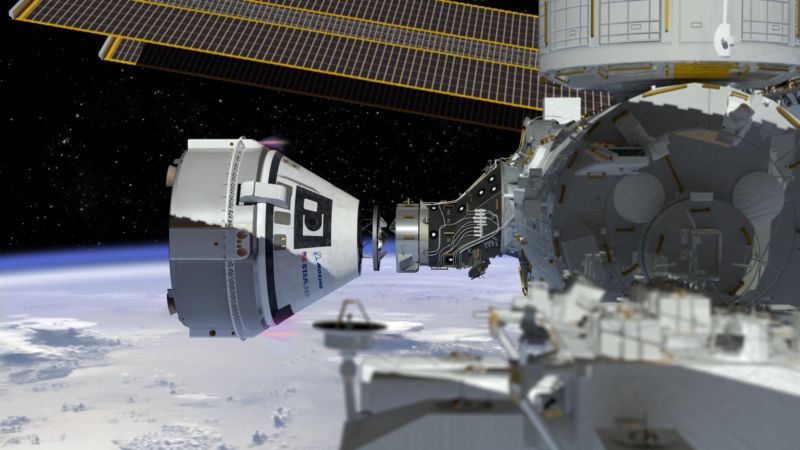A port in the storm —
The first hurdle for Starliner: Finding an open port on the space station
Eric Berger
–

Enlarge / What a docking of Boeing’s Starliner to the International Space Station will look like.
About five weeks have passed since Boeing updated the status of its Starliner spacecraft, with the company saying it was “evaluating” a new target launch date for its next mission. This test flight of Starliner, which will not carry crew, is destined to launch on an Atlas V rocket and dock with the International Space Station for about a week before returning to Earth.
Despite the lack of an official update, it now seems likely that Boeing and NASA are targeting late July or early August for this test flight. This is largely due to traffic at the International Space Station rather than the readiness of Starliner itself. Two NASA sources said the vehicle is “close” to being ready, with only a few small tests to certify the spacecraft for flight remaining. Starliner is therefore expected to be ready to fly by early summer.
Traffic jam
The primary issue is the availability of space station docking ports fitted with an “international docking adapter,” which are used by SpaceX’s Crew Dragon, Cargo Dragon 2, and Starliner vehicles. There are presently two such ports on the station, and for NASA, the priority for access to these ports are crew rotations followed by supply missions. So the question becomes when the Starliner test flight can find an open slot on station.
The Crew-2 mission, carrying four astronauts on SpaceX’s Crew Dragon vehicle, is expected to launch on April 22 and remain attached to one of these ports for about six months. Then, on June 3, a SpaceX cargo supply mission (CRS-22) is due to launch and occupy the other port.
Thus, there will be no docking ports available this summer until about July 20, the approximate date when the CRS-22 Dragon will depart the station and return to Earth. This departure will open an approximately one-month window during which Starliner could make its test flight. Therefore, although NASA and Boeing have not yet made a target date public, we can expect this flight to take place no earlier than late July or early August.
Starliner would likely remain attached to the station for about a week—depending on the needs of the International Space Station program—before landing in the southwestern United States. The next Dragon supply mission, CRS-23, is slated to arrive in late August, by which time Starliner will need to have left.
The upcoming Starliner test flight will be the vehicle’s second uncrewed flight, which was necessitated after a problematic test mission in December 2019. During that flight, several software problems caused the spacecraft to be nearly lost minutes after launch and then again shortly before it was due to re-enter Earth’s atmosphere. NASA declared the mishap a “high-visibility close call.” As a result, Boeing agreed to perform a second uncrewed test flight after a rigorous review of the vehicle’s flight software.
When crew?
After this repeat test flight, which is officially known as Orbital Flight Test-2, NASA and Boeing will perform a detailed data analysis. One source said that optimistically, this process would require about six months. This would push a crewed test flight into January 2022. Another NASA official said the spacecraft would not fly until the “hardware is ready and it makes the most sense to fly based on station’s needs.” He added that there is no clock on this crewed flight test, since NASA already has an operational vehicle, Crew Dragon, to meet its astronaut-rotation needs.
One source expressed “hope” that a 2021 launch date could be found for Starliner’s crew test flight, but more realistically, the mission will slip into 2022. Although there is an availability of space station ports in November, there are presently no slots in December. A source with knowledge of space station flight schedules suggested that the best opportunity for Starliner’s crewed flight test, commanded by astronaut Butch Wilmore, would likely come in February 2022. At that time, tentatively, there is scheduled to be an open docking port on the station. This slot would also provide about seven months to assess data from Orbital Flight Test-2 and clear humans to fly on Starliner.
Finally, if this crew test flight is successful, Boeing could fly its first “operational” Starliner mission for NASA. This would carry a full complement of four astronauts to the space station for about six months and would happen sometime later in 2022, most likely during the April or September time frames.

